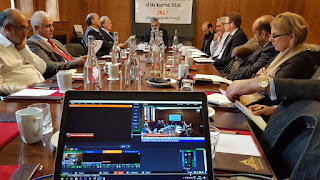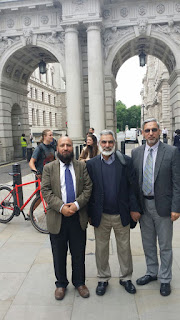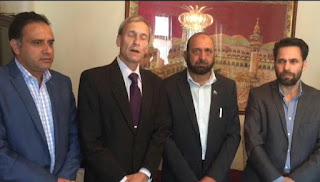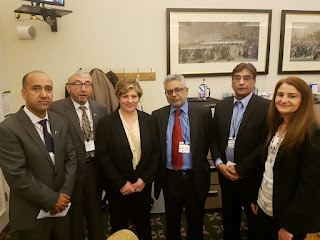JKLF Diplomatic Bureau sent a letter to Rt. Hon. Baroness Patricia Scotland of Asthal QC,
Secretary-General of Commonwealth urging her to set up a mediation panel from members of commonwealth states for a peaceful and lasting settlement of the long standing Kashmir issue.
Contents of the letter is below
Rt. Hon. Baroness Patricia Scotland of Asthal QC
Secretary-General of Commonwealth
Marlborough House,
Pall Mall London
SW1Y 5HX
8 December 2017
Dear Baroness Scotland,
Re: The unresolved issue of Jammu Kashmir’s political Status and reunification
We take this opportunity to extend our heartfelt felicitations on your appointment at the 24th Commonwealth Heads of Government Meeting – CHOGM – as the sixth, and first female Secretary –General of the Commonwealth in 2016. We also offer our warm wishes for a successful forthcoming 25th CHOGM, in April 2018. We hope that at its 25th CHOGM, this family of nations will take positive and constructive steps, on the issue of Jammu Kashmir’s, (Kashmir) political status and reunification.
The Commonwealth, as a family of nations has a common heritage, based primarily on being subjected to a lengthy colonial rule. It is a unique body of nations upon which the malevolence of imperial rule engendered a kindred spirit of solidarity, respect for freedom, democracy, and rule of law as a basis for its historic bonds. Subjugation without a doubt is a painful experience while freedom for the colonised peoples of the British Empire, was indeed a time of happiness and rejoicing.
Excellency as you said on becoming the Secretary- General of the Commonwealth that “the Commonwealth shares a great deal. It has 33% of the world’s population. It has the capacity to bring together people of all religions. Concentrates on what joins us. It’s a real opportunity to invest and work together. If you work together with people respectfully, you can bring about change. Human rights and development go hand in hand.” Indeed you alluded to some commendable aspects of the commonwealth to which we could add, the body’s dedication to peace in the world, liberty and equality. Undoubtedly many governments within this family of nations, endeavour to put these values and principles into practice for their citizens.
However, for some decolonisation, has left a legacy of conflict, separation, oppression, subjugation, and denial of fundamental rights, including the right of self-determination, and of nationhood. In this respect this family of 52 nations has failed to bring about the change that you so eloquently stated in the text quoted above.
Countries like India, who won their freedom through protracted struggles, adopted colonialist policies of their own with violent oppression, and utter disregard for human and political rights of nations and minorities under their de-facto control – as indeed is the case in Kashmir – whose inhabitants are being denied the right to exercise their free will on the political status of their country.
For 20 million Kashmiris this has been their most poignant experience of neo-colonialism since 1947.
Lives of ordinary people are blighted by militarised violence. They are denied their fundamental political and human rights, across the so-called cease-fire line or the Line of Control – LoC – that forcibly divides their country between India and Pakistan. There is no liberty, there is no respect for human rights, and there is no democracy in Kashmir. There is only Indian ‘democracy’ which has made Kashmir, the most heavily militarised occupied country in the world.
Excellency in our considered view, Commonwealth’s failure to uphold the inalienable right of twenty million Kashmiris, is a dereliction of international duty and moral responsibility. Because the denial of an unfettered political choice to Kashmiris, is in contravention of UN Charter and many of the world body’s resolutions that affirm their right to decide.
For seventy years now India and Pakistan, two prominent Commonwealth countries are locked in conflict, over their claims and counter claims on the future status of Kashmir. Both countries have fought full scale wars several times since their independence. Daily exchanges of fire by the Indian and Pakistani armies along the five hundred miles long cease-fire line, makes it absolutely impossible for tens of thousands of civilians on both sides of the divide to lead a normal existence. Many lives are destroyed through death and destruction.
Thus the Indo-Pakistan dimensions over Kashmir continue to cause immense suffering and miseries for people on both sides with nothing in sight by way of redress and justice for them. The entrenched positions of both countries have rendered the Kashmiris invisible, which is nothing less than a tragedy of epic proportions for a country that is as big as Britain in size.
Large military presence in the territory in itself is a major impediment to peace in the region and the world. It is also a constant physical and psychological threat and danger to the population of Kashmir. India alone has more than half a million regular military personnel plus tens of thousands of paramilitary forces deployed in the Indian held part of the territory. Pakistan in its held part of the State has perhaps deployed up to a hundred thousand troops that confront the Indian forces across the cease-fire line. Both countries are nuclear powers and continue to spend large parts of their GDP on bolstering military strength to counter each other.
Over the past thirty years India’s militarised violence in the State has resulted in thousands of deaths. Jayanth Jacob and Aurangzeb Naqshbandi quoting Indian government’s figures, reported in the Hindustan Times on 25 September 2017 that 41,000 deaths took place in Indian held Jammu Kashmir over the past 27 years. The real figure of deaths however, may well be over a hundred thousand. Contrary to claims by the Indian authorities, an overwhelming majority of the dead and thousands of the disappeared are civilians. There are thousands of unmarked graves all over the Indian held part of the State without explanation.
Excellency in 2008 Kashmiris transformed their struggle from one of militancy to a non-violent one at the behest of the international community, with the hope that India would respect this historic transformation. India on the other hand unleashed her military might on the people of Kashmir, to crush their peaceful movement for a dignified future as a free nation. In 2008 Indian army killed 58 innocent civilians, and in 2009 40 civilians were killed, while in 2010 the Indian army killed 130 civilians. In the current peaceful resistance 150 civilians have been killed by Indian forces.
Over the past nine years around 25 thousand people have been injured, including those whose lives have changed for ever due to the severity their injuries. During 2016 around 5 thousand have been directly hit in their eyes with the use of pellet guns. Many of those hit have lost their eyesight completely.
It is quite clear from the extremely aggressive militarised violence that the Indian government wants to beat the peaceful political resistance of the people into submission. Kashmiris are used as human shields. Targeted killing of civilians, fake encounters and torture are used as means of suppression. This oppression and inhuman by the military is openly defended by Indian authorities, including the military that war necessitates such methods.
Excellency Indian government is at war with the people of Kashmir, and expects them to surrender before the naked state oppression, and to be forced to give up the right to freedom. Despite undemocratic actions and machinations of the Indian authorities, pro freedom Kashmiri leadership is continuing the peaceful political resistance to strive for dignity, democracy, liberty, justice and freedom.
The Joint Resistance Leadership – JRL – comprising of Mr Muhammad Yasin Malik, the head of the Jammu Kashmir Liberation Front,-JKLF- and the veteran Kashmiri leader Syed Ali Shah Gilani and Mirwaiz Umar Farooq of the All Parties Hurriyat Conference, – APHC – are deprived of their fundamental democratic right of free speech, right of movement, and assembly by being subjected to house arrests, and incarceration.
Excellency the government of Pakistan should also be called upon to restrain itself from integrating the Gilgit- Baltistan - GB-region of the State as province of its federation. Under the UN Charter and over a dozen UN resolutions on the future status of Kashmir, India and Pakistan are duty bound to safeguard the territorial integrity and unity of the divided State. And also call upon the government of Pakistan to facilitate for a joint administrative set up of GB and Azad Jammu Kashmir with a democratically elected assembly through universal suffrage, and a democratic constitution for the joined up territories of the State under its control, as an interim solution until the final settlement of the Kashmir issue.
Excellency, India needs to be reminded that it too is subject to the UN Charter and her obligations to Kashmir’s future status. And India needs to be reminded about her obligations regarding the inherent and inalienable rights of 20 million Kashmiris to an unfettered political choice. India needs to be reminded that Kashmir is not an integral part of India nor an internal law and order issue. India needs to be reminded on the unbridled use of militarised violence against civilians, and political dissent by its forces. India needs to be reminded that massive human rights violations must stop, and those responsible must be brought to justice. India needs to be reminded that arrests and victimisation of activists for political expediency must not be allowed to continue in Kashmir. India needs to be reminded that the JRL must not be deprived of its democratic right of free speech, of assembly and the right to engage with the masses in all parts of the State. India needs to be reminded that it must allow the UNHCR access to Kashmir, to investigate excesses against civilians and political dissent committed by its forces.
Excellency in conclusion, irrespective of India’s importance and size within the Commonwealth or in the global sphere of influence, we urge the 25th CHOGM to adopt a constructive approach and actively engage with India and Pakistan for an equitable settlement of the Kashmir issue, which is based on the unfettered right of Kashmiris across both sides of the cease fire line.
Excellency Kashmir is not a territorial dispute between India and Pakistan but an international issue concerning the future status of a nation. Kashmiris want peace and prosperity for their country, and wish Kashmir to become a bridge of peace and amity between India and Pakistan, and not a perpetual bone of contention. In the interest of peace and prosperity for all we urge the 25th CHOGM to set up a mediation panel from the Commonwealth family of nations engage closely with India, Pakistan, the Kashmiris, and the U N Secretary General, for a peaceful settlement of the long standing Kashmir issue, which is acceptable to all the stakeholders in the conflict.
With regards
Prof Zafar Khan
Diplomatic Bureau –
Jammu Kashmir Liberation Front-JKLF-
London Secretariat
119-123 Cannon Street Road
(Basement North)
London
E12LX














































